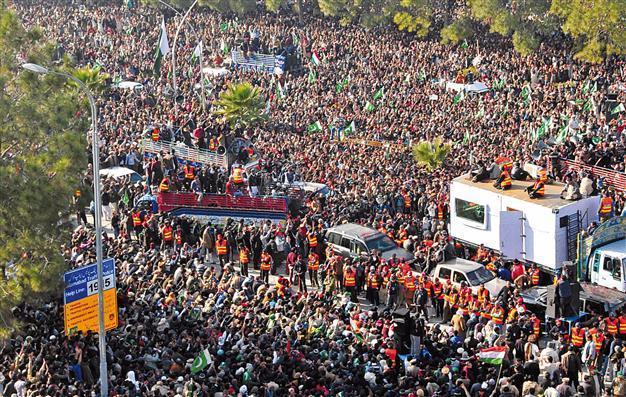Court’s arrest order for PM fuels Pakistan crisis
ISLAMABAD

Pakistan’s top judge yesterday ordered the arrest of the prime minister over corruption allegations, ratcheting up pressure on a government locked in a showdown with a cleric who has a history of ties to the army.
Chief Justice Iftikhar Muhammad Chaudhry ordered the arrest of 16 people accused in graft allegations over power generation projects in 2010 and told them to appear in court on Jan. 17, a lawyer for the national corruption watchdog said.
The government, however, said yesterday it had yet to be notified in writing of any arrest order against Prime Minister Raja Pervez Ashraf.
“So far we have not received anything from the Supreme Court in writing. The government, the law ministry and the prime minister have not received any order from the Supreme Court,” Information Minister Qamar Zaman Kaira told private TV station Geo.
“The timing of the decision should be noted. As far as I have been told, the prime minister’s name is not mentioned in the Supreme Court order and hype has been created,” he said.
The Supreme Court order came as thousands of people led by cleric Tahir-ul Qadri demonstrated close to Parliament on the third day of a mass-protest march, demanding the immediate dissolution of the government. An intelligence official has estimated the size of the crowd at 25,000, which would make it the largest political protest in the capital since the government led by the Pakistan People’s Party (PPP) was elected in 2008. Qadri’s supporters camped out near Parliament cheered and danced when told of the order against Ashraf. “This is our first victory. We will stay here until all our demands are met,” Qadri’s deputy, Sadiq Qureshi, told the crowd.
The combination of the possible arrest order for Ashraf and the mass street protest led by Qadri raised fears among politicians that the military was working with the judiciary to force out a civilian leader.
“There is no doubt that Qadri’s march and the Supreme Court’s verdict were masterminded by the military establishment of Pakistan,” Fawad Chaudhry, an aide to Ashraf, said. “The military can intervene at this moment as the Supreme Court has opened a way for it.”
Qadri, who played a role in backing a military coup in 1999, threatened to remain camped out near the federal Parliament with thousands of supporters until his demands for the resignation of the government were met.
A general election is due to be held by mid-May, but Qadri has demanded that a caretaker government be set up immediately, in consultation with the military and the judiciary, and implement key reforms before elections are held.
President Asif Ali Zardari hopes to lead the first civilian government in Pakistani history to complete a full term and hold elections. Any move to oust the prime minister would not automatically trigger the collapse of his coalition since lawmakers can simply elect another prime minister.
But power struggles distract the government from tackling an array of problems - a Taliban insurgency, economic stagnation, and growing sectarian tensions triggered by bomb attacks and tit-for-tat shootings. Government officials said they were baffled by the arrest order.
“This was totally unexpected,” an official in Ashraf’s office said. “The prime minister and two or three of his friends were watching Qadri speak on television and this suddenly happened.”
Ashraf took office in June last year after the Supreme Court dismissed his predecessor Yousuf Raza Gilani for contempt, after Gilani refused to ask Swiss authorities to reopen corruption cases against the president. Pakistan’s stock exchange fell by more than 500 points, or nearly 3 percent, on news of the court order, due to fears over fresh political turmoil, which comes against a backdrop of militant bombings and tension on the border with India.
Compiled by the AFP and Reuters stories by the Daily News stories.
No business as usual with Pakistan: Indian PM
NEW DELHI – Agence France-Presse
Indian Prime Minister Manmohan Singh warned yesterday that there “cannot be business as usual” with neighboring Pakistan after last week’s deadly flare-up along the border in disputed Kashmir. “It cannot be business as usual” with Pakistan, he told reporters on the sidelines of an army function. “What has happened is unacceptable,” he added in reference to the killing of two Indian soldiers, one of whom was beheaded. “Those responsible for this crime will have to be brought to book.” Singh’s comments came a day after commanders of the rival armies traded protests over the border exchanges and the chief of India’s million-plus military ordered an “aggressive” response to any fresh cross-border firing. The Indian government has accused Pakistani soldiers of crossing into Indian territory and killing two of its soldiers on Jan. 8. Pakistan denies its troops were involved in any such incident and has accused Indian troops of killing two of its soldiers. Foreign ministers of both sides have warned against escalating tensions. But the Indian army chief of staff told his commanders Monday to respond “aggressively” to any future Pakistani firing across the de facto border in Kashmir, known as the Line of Control.
 Pakistan’s top judge yesterday ordered the arrest of the prime minister over corruption allegations, ratcheting up pressure on a government locked in a showdown with a cleric who has a history of ties to the army.
Pakistan’s top judge yesterday ordered the arrest of the prime minister over corruption allegations, ratcheting up pressure on a government locked in a showdown with a cleric who has a history of ties to the army.